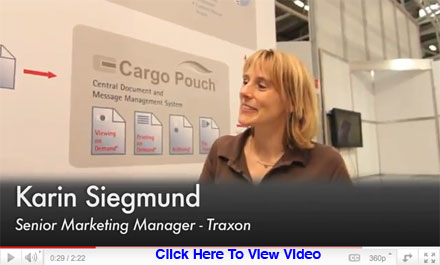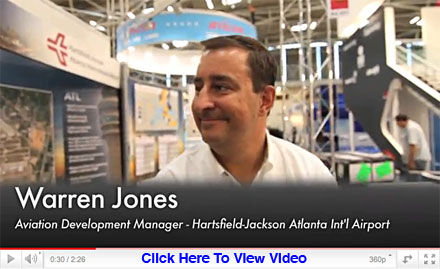The Week After FRA Night Ban
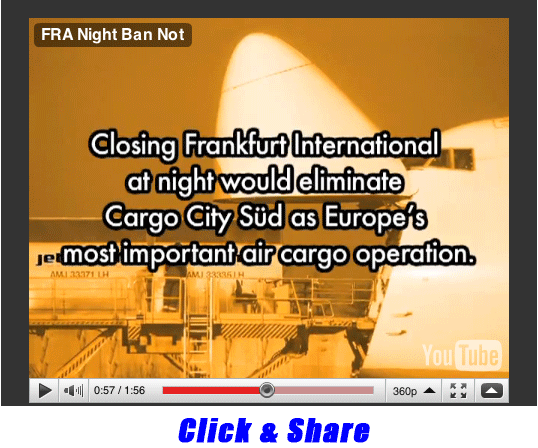 It
is the story of the year. It
is the story of the year.
The impending closure of Frankfurt International
Airport at the end of this month means many things, depending on to
whom you speak.
But last week the FRA night flight ban
swept attention away from a speech by Des Vertannes at FRA ACD, discussions
about air cargo security, and even talk about the current state of
the air cargo business.
In perhaps the strangest twist of fate,
starting October 21 a brand new runway at Frankfurt International
Airport will stand ready to greet even more flights whilst easing
operations at Germany’s major aerial gateway.
But for air cargo, which lives operating
at night, the new runway will stand empty and unused all night long,
like a big Oktoberfest party with food and oompah band playing to
an empty beer garden.
Resident complaints of aircraft noise
have led to night flights being banned at Frankfurt Airport (FRA)
as ruled by a Hessen court. Although Germany’s Federal Administration
Court will make a decision on night flights at FRA early next year,
which may allow for some wiggle room, here are some thoughts in preparation
for how the ban, ongoing between 11 p.m. and 5 a.m., will affect air
cargo.
Meantime Lufthansa has made the argument
that opening the new Northeast runway scheduled for later this week
on October 21 right now is a runway too far, and should be delayed.
Germany’s largest airline and
10% owner of Fraport reasoned that the local court decision to close
the airport from 11 to 5 am October 30 would not have to be executed
since it is bound to the opening of the new runway.
That request to Fraport went nowhere
with the airport operator brushing aside the Lufthansa request saying:
“We badly need the additional
capacity because Frankfurt airport has operated at and often beyond
its limits for years.”
Most severely hit by the judge’s
short-notice decision, Frankfurt-based Lufthansa Cargo will have to
reschedule eleven night flights in the winter timetable commencing
the end of this month, with some of them being threatened with total
cancellation that will cost the carrier millions of euros and disrupt
its supply chains completely.
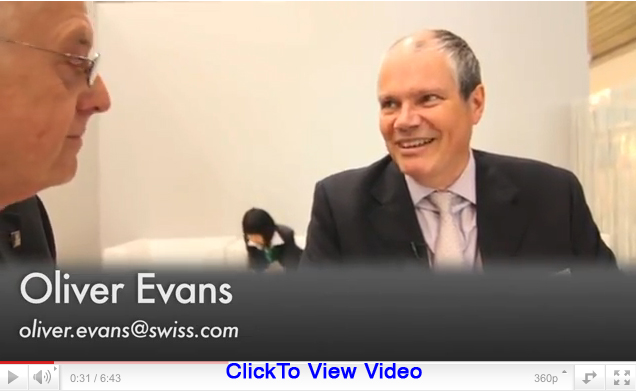 |
“I don't know how
the night flight ban in Frankfurt will impact business; actually,
nobody knows,” Oliver Evans, Chief Cargo Officer at Swiss WorldCargo,
told FlyingTypers.
“Now everyone is focused on the
dramatic headlines, and indeed the decision is dramatic.
“The possible implications are
huge, not only for the industry or the wider economy of Germany, but
for Europe and indeed beyond in countries that don't (yet?) know of
such constraints.
“At the same time, major players
involved will be seeking redress or adjustments via other channels,
such as ministerial ones.
“And solutions or workarounds
will be found.
“Human ingenuity and adaptability
will see to that.
“No harm done?
“Of course untold damage has been
done, if only by forcing business into unplanned and less-than-ideal
lanes, making our services more costly.
“Should we then blame the court?
“Or the politicians that make
and break promises?
“Or the public who vote for those
same politicians or cry out for action without giving a thought to
consequences?
“Again, of course not.
“We should look at ourselves,
and acknowledge that our recent efforts to publicize the enormous,
beneficial role we play in world trade have come far too late.
“We need to redouble our efforts
to reach the wider public through the Internet, blogs, direct dialogue
through street action, and many other avenues.
“Will air cargo need to change
the way it does business?
“Darn right it will, but not because
of a tsunami, or this man-made shock-wave.
“Because we are human, and have
so much to learn.”
(Editors Note: Never at a loss for words, Oliver Evans Chief Cargo
Officer at Swiss World Cargo regularly tackles some hot button issues
at play in the air freight industry today.
Here is an Oliver interview created during Transport Logistik Europe.
Six months later we think the words still stand up.)
 “Whatever
Frankfurt Airport loses will be someone else's gain. I hope they have
done their homework and will provide alternatives,” says Issa
Baluch. “Whatever
Frankfurt Airport loses will be someone else's gain. I hope they have
done their homework and will provide alternatives,” says Issa
Baluch.
Best known as the founder of Dubai-based
Swift Freight, a medium-sized multi-national eventually sold to Barloworld,
Issa is the guy that launched sea-air in Dubai.
These days, in some kind of “retirement”
(as if he ever could be), Issa is now teaching logistics at Harvard
in the USA.
“Air cargo people should immediately
explore usage: the use of other airports.
“Right now we are watching to
see the impact and the alternatives FRA Airport is going to provide
and we are also studying other options that we can engage in, in the
event that what FRA Airport may offer is not workable.
“But looking ahead, the broader
impact this ban will have on air cargo is immense and not easy to
overcome.
“Frankfurt without night flights
creates a bottle-neck in one stroke.
“Also to be noted and considered
is that if this ban is actually applied in a couple of weeks –
once FRA Airport loses out, it will take them a long time to replace
it.
“For those who may think that
air cargo will have to change the way it does business and no longer
be a ‘night animal’—well, saying it is much easier
than any real change.
“Once a night animal, always a
night animal.
“This is where the economic/flexibility
benefits are derived.”
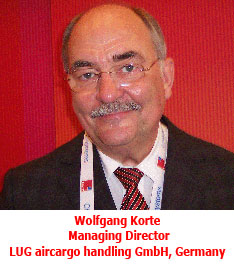 If
there is one thing that Wolfgang Korte, top officer of LUG, the air
cargo handler located in Frankfurt International Airport’s Cargo
City Sud, knows, it is that with the gateway’s newest and most
advanced air cargo facility about to debut, housing his company and
life long dream, right now is no time to be a shrinking violet when
it comes to telling it like it is about the upcoming ban on night
flights at mainland Europe’s premier air cargo gateway. If
there is one thing that Wolfgang Korte, top officer of LUG, the air
cargo handler located in Frankfurt International Airport’s Cargo
City Sud, knows, it is that with the gateway’s newest and most
advanced air cargo facility about to debut, housing his company and
life long dream, right now is no time to be a shrinking violet when
it comes to telling it like it is about the upcoming ban on night
flights at mainland Europe’s premier air cargo gateway.
“The FRA night curfew that the
Hessian state court in Kassel instituted has been based on complaints
from towns and citizens as related to the new runway.
“Presently, LUG is not impacted
because all our customers operate during the day.
“We are operational around the
clock and carry out our cargo handling activities during the night
in preparation for next day's take offs.
“In the interim, Hahn, Cologne
and Leipzig offered to serve as alternatives.
“Given that LCAG is already in
cooperation with DLH/Aerologic at LEJ (Leipzig), it is conceivable
that transports would be diverted there.
“Another scenario is to squeeze
the night flights into the daytime with the opening of the new runway,
enabling about 1,300 flight movements per day; the 17 additional night
flights wouldn't be an issue.
“The problem is the destination
airport(s) where existing slots cannot be added on short notice -
e.g. PVG.
“In any case, this court decision
creates a huge and extremely expensive challenge to LCAG operations.
“The customers have been informed
but there's general dismay over this state court's decision in light
of the pending federal court case in Leipzig, where a decision was
due around the end of 2011 or early 2012.
“Obviously, the forwarders are
all waiting for alternative plans from the airlines impacted by the
night flight ban.
“Over the longer term, it should
be possible to develop solutions that could limit the damage; however,
in the immediate and short term the main impact is clearly borne by
LCAG because of the extremely short term to the ban becoming effective
on October 21.
“Most likely, LCAG representatives
are best positioned to offer more qualified information as it is safe
to assume they have been up to their eye balls in various versions
of ‘plan B.’
“This indeed could be the beginning
of the end for the ‘cargo night animals’ as there are
other regions where efforts to institute a night flight ban are underway.
“Ultimately, the final and compelling
indication in this matter will come from the Federal Court in Leipzig.
Geoffrey/Ted/Heiner/Flossie

Last Thursday, Germany’s Federal
Administrative Court rejected claims to extend the night flight curfew
at new airport Berlin-Brandenburg, “Willy Brandt,” beginning
at 10pm and ending at 6am.
This operational constraint was demanded
by a number of neighboring communities, together with residents, in
a test case.
They justified calling upon the High
Court with evidence of intolerable noise emission exposures caused
by departing and landing aircraft at the German capital’s future
airport during late evening and early morning hours.
By rejecting this claim, the judges
at Leipzig’s Federal Court confirmed with their verdict both
Berlin’s and neighboring Brandenburg State’s original
assurance guaranteeing the airport to operate between 5:30am and 11:30pm.
Hence, the facility will only be closed during the core night hours
and not between 10pm and 6am as hoped and demanded by the critics.
Berlin’s mayor, Klaus Wowereit,
welcomed the Federal Court’s decision by saying that “the
ruling is important for our future economic development.” Managing
Director Ralph Beisel of the German Airport Council – ADV –
spoke of a “highly important call by the judges that levels
the way for the capital’s future gateway.” Wolfgang Krueger,
Managing Director of the Chamber of Commerce and Industry in Cottbus
pointed out that the court's reasoning explicitly emphasized the economic
importance of late evening and early morning flights at Berlin-Brandenburg
airport both for the city and the entire region. Said Krueger: “the
airport can now operate as planned, which will surely stimulate further
growth and encourage private capital to invest.”
Spokesman Michael Goentgens of Lufthansa
Cargo also reacted with relief after the shock his airline got earlier
this week when a local court in Hesse State completely and unexpectedly
imposed a night flight curfew on Rhein-Main airport, Germany’s
by far busiest passenger and cargo hub.
“We welcome the Leipzig Court’s
decision and hope it will be a positive signal for the Federal Judge’s
upcoming decision on night operations at Frankfurt,” exclaimed
Michael.
Heiner Siegmund
|
